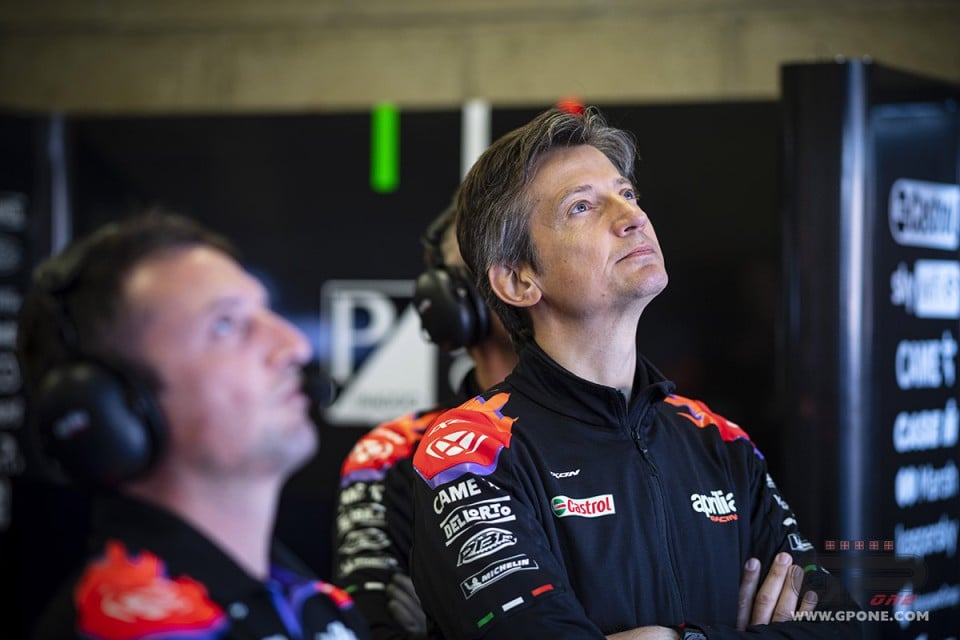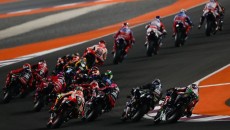Aprilia is facing a difficult end to the 2023 championship. Yesterday in Losail there was an altercation - with punishment - for Aleix Espargaró, found guilty of having 'slapped' Morbidelli (on his helmet). The Spaniard's bad day then ended with an incident on the first lap of the Sprint, while Vinales finished in sixth position.
The victories at Barcelona (with a double in the Sprint) and Silverstone, third place at Assen, as well as the three second places of Maverick in Portimao, Barcelona and Indonesia all seem very distant.
The Noale company had set out to play the role of second force in the championship, behind Ducati, also showcasing some technical innovations that preceded the Borgo Panigale company itself.
It also finally started with a second satellite team, albeit penalized by the fact that it only had RS-GP 22s at its disposal, but the results picked up, although interesting, did not allow it to spread its wings
There are problems before everyone's eyes, so what follows and appears to be criticisms are merely observations.
Its rider duo is fast, but inconsistent. To put it in football terms, the striker is missing. The man who always makes the difference. Something that can be fixed next year when the global rider market reopens with all contracts expiring.
The Noale manufacturer has been looking at Quartararo for some time now, but it must hurry up and act, and not only with wallet in hand. It must demonstrate that it knows how to do the right things. And this leads to the second problem: the satellite team.
Currently as things stand, the RNF Aprilia is of little use: the data is not very comparable because it comes from different bikes. The team is also said to be experiencing financial difficulties. Massimo Rivola doesn't talk about it openly, but he doesn't deny the paddock gossip which is whispering about delays in payments. The mechanics talk to each other and to their colleagues. For goodness’ sake, this has already happened and will always happen. There is no point in attaching yourself to sponsors deemed unreliable from the start. This is just talk.
“To protect ourselves, we take out insurance against this type of situation - Uccio Salucci told us, regarding the management of the Mooney VR46 team - we pay more than 100,000 Euros a year, but in some cases, it is money well spent, even if our partners are names that need no introduction."
Prevention is better than cure and while waiting for the impasse to be clarified, Carmelo Ezpeleta is dealing directly with it.
In the meantime, there are already those who are coming forward to possibly take the place of the current financiers. A team that competes in the lower categories, where it has great success, has long been ready to step forward, but in the words of Massimo Rivola: "if Carmelo wanted it in MotoGP, it would already be here".
True. But it is also undeniable that MotoGP must set rules for itself in many areas. Rivola, who comes from F1, says: "we need a Concorde Agreement".
The Concorde Agreement is a commercial accord that regulates the participation and economic treatment of all the teams participating in the Formula 1 world championship. The content is confidential, and therefore only some general terms of the current text, which is the eighth, are known. The first original was signed on 5 March 1981. The current pact, signed in 2020, will expire at the end of 2025.
The name derives from Place de la Concorde in Paris, where the headquarters of the International Automobile Federation is located.
This should take responsibility for the reliability of all the ‘teams’ because this is what guarantees the continuation of the show.
The Concorde Agreement aims to protect the value of existing teams by requiring new entrants to pay $200 million upfront, split equally among 10 existing teams, in exchange for revenue sharing rights in the first year of competition. Naturally, for motorcycling the figures should be largely revised, but there should be written rules which currently do not exist.
It's all entrusted to the FIM and Dorna, which is equivalent to saying: to Dorna.
This reasoning also applies to the contracts that bind the riders to the teams: the current situation, triggered by the Marquez-Honda divorce, is causing a chain reaction, with other divorces and financial compensation, but above all giving a confusing and unprofessional image of MotoGP. How can a sponsor decide to invest millions without being certain of what it will finance?
The discussion is obviously complex and, as we said at the beginning, what seems critical are simple observations before everyone's eyes. MotoGP is a great show, but in the end all the problems come to a head and there are many problems to solve. Maybe too many. And perhaps because it has let itself run on vulnerabilities known for some time.
We started the article by talking about the problems related to Aprilia, but almost no team is immune to situations that need to be resolved. From technical problems due to regulations that seem immutable - they will be until 2026 - only to then change without logic when Ezpeleta is forced to resort to his Golden Vote to resolve a problem. The example of the Ducati front shapeshifter, banned this year despite being perfectly legal in accordance with the regulations, is illuminating in this sense.
The fact remains that the first ones that must raise the level of professionalism are the teams. For example, this year Aprilia has equipped itself with its own medical structure - Lifenet Healthcare - because while the performance of the bikes is important, the health of the riders is equally important.
In short, MotoGP needs to start thinking about exploiting lateral thinking and not throwing itself like a bull against the red cloth of problems, as it did this year by doubling the number of races to have greater visibility. Which has meant that to this day we have never had a complete starting line-up of starting riders.
Quantity is not synonymous with quality. In the end, a sponsor being late with payments, or even disappearing is nothing new. A good show needs a good theatre and impeccable organization. This year's MotoGP has been bulimic in every way: in the number of races, in the number of accidents, in penalties not always imposed correctly, in the crazy rider market. And we could go on...










